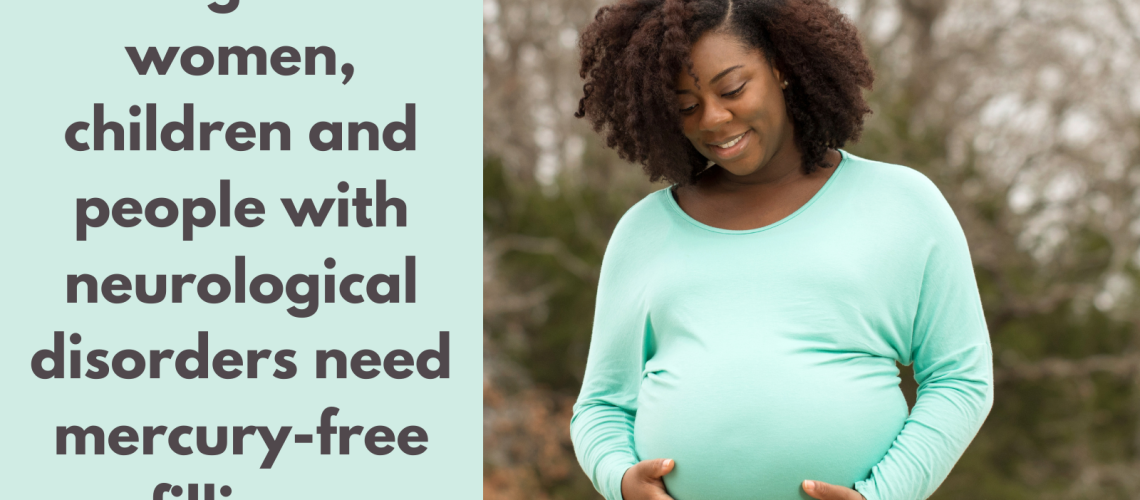For Immediate Release
A full year after FDA recommends using alternatives to mercury dental fillings for children and most young women, federal bureaucracies providing and financing dental care continue to ignore the new federal health policy. (White House CEQ letter at bottom of this page)
Contacts:
- Charlie Brown. Consumers for Dental Choice, 202-246-7642, charlie@toxicteeth.org
- Tracy Gregoire, Learning Disabilities Association of America, 207-504-2556, tracy@ldaamerica.org
- Nsedu Obot Witherspoon, Children’s Environmental Health Network, nobot@cehn.org, 202-543-4033
Washington, DC – Frustrated that a year has passed since the US Food and Drug Administration, over 50 organizations have now turned to the White House, calling on Council on Environmental Quality to insist that federal agencies providing dental care implement the new federal health policy.
The U.S. Food and Drug Administration, on September 24, 2020, issued a safety communication admonishing the use of amalgam for “high-risk populations” – defined as (1) children; (2) women who are pregnant, breastfeeding, and planning to become pregnant; (3) people with neurological disorders; and (4) people with kidney impairments. Despite the availability of alternatives that are comparably-priced, safe, and environmentally friendly, federal agencies, which provide dental care to millions of Americans, have yet to implement these recommendations.
A primitive, pre-Civil War pollutant, amalgam is 50% mercury. FDA stepped up a year ago to end the two-tiered dentistry and extend the protection across the board, regardless of income, race or social status, for children and most young women. The movement to end amalgam is worldwide – the United States is a party to the Minamata Convention on Mercury, calls for each party to initiate a transition to mercury-free dentistry
“One would suppose that our government agencies would be first in line to implement federal health policy to the consumers they serve — but the reverse is true,” said Charlie Brown of Consumers for Dental Choice. “Dug-in bureaucracies who serve millions of Americans, like the Department of Defense, the Indian Health Service, and the Bureau of Prisons, are not following federal health policy – nor is Medicaid the chief financer of dental care for the poor.”
“The whole life cycle of amalgam adds to cumulative and disproportionate impacts on communities of color,” said Nsedu Obot Witherspoon, Executive Director of the Children’s Environmental Health Network. “These communities already face higher exposure to mercury and other harmful chemicals where they live, learn, and work.”
“Even a small exposure of a neurotoxin at the wrong time of development can have a lifelong impact, including in the womb and for the breastfeeding baby” said Tracy Gregoire with the Learning Disabilities Association of America. “There is no known safe level of mercury for children or adults.”
“Amalgam use by these government bureaucracies means that military bases, Tribal Lands, and federal prisons become increasingly polluted with toxic mercury,” said Pam Miller, Executive Director of the Alaska Community Action on Toxics. “We must stop this unnecessary polluting of places where Indigenous Peoples, service members, and institutionalized persons live.”
“The National Medical Association has called for the immediate end of amalgam use in high-risk populations in all government programs,” said Dr. Mark Mitchell, Co-Chair, Commission on Environmental Health for the National Medical Association. “Amalgam is prevalent in government programs and institutional dentistry. A year is long enough. These programs must heed the FDA recommendations and end the use of amalgam in high-risk populations including children, pregnant and nursing women.”
“No safe level exists – for people, for food, or for fish,” said Eve Gartner, managing attorney for the Toxic Exposure and Health Program at Earthjustice. “Proven and safe alternatives to amalgam are available – which middle-class Americans get now. It’s time that the FDA safety communication apply to all people receiving care done by, or financed by, our federal government.”
“The ask to the Council on Environmental Quality is simple: tell the Indian Health Services, Department of Defense, Bureau of Prisons, and the VA to immediately cease placing amalgam in these vulnerable populations highlighted by the FDA: children; women who are pregnant, breastfeeding, or planning pregnancy; patients with kidney disease; and patients with a neurological disease,” said Katie Huffling, Executive Director of the Alliance of Nurses for Healthy Environments.
Amalgam is the largest use of mercury in America today. Because it is implanted into people, its pollution cannot be contained by technology – hence the mercury goes into the water and then into fish, and into the ground and then into vegetables. Signing onto the letter to CEQ include disability, health, environmental justice, and major environmental groups such as Earthjustice, the Sierra Club, and Greenpeace.
The signers commend the U.S. Food and Drug Administration for this initiative. FDA not only issued recommendations, but followed up with useful Infographics, both in English and in Spanish.
Additional Resources:
- Letter to the White House CEQ
- FDA press release of the agency’s recommendations on amalgam 9/24/2020 and FDA information on amalgam fillings
- Video on Mercury Free Dentistry
- 2018 Groups issue Chicago Declaration to End Dental Industry Mercury Use
- The Journal of the National Medical Association in 2018 commentary “Is Amalgam Toxic to Children of Color?”


